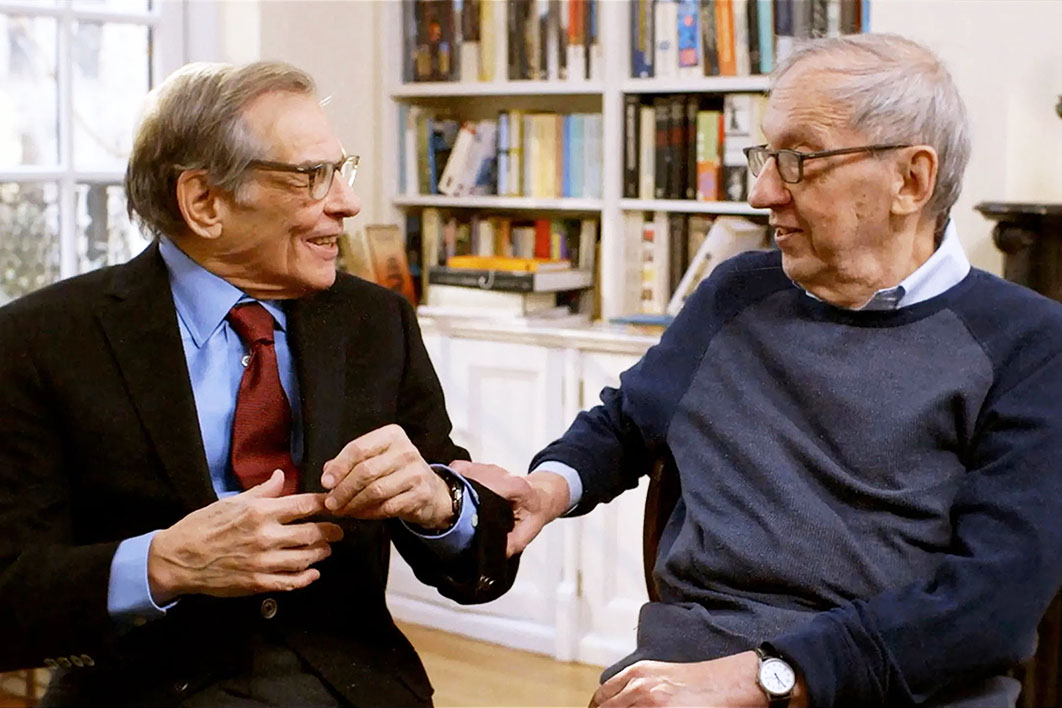The set-up: Two elderly, literary men. The first: Robert Caro, eighty-seven. Author. The second: Robert Gottlieb, ninety-one. Editor.
The link: over a period exceeding fifty years the two have collaborated on five volumes of biography, four of them dealing with the same man. One a decade. Big, fat books, each a thousand pages or more in length. Doorstoppers.
Outside work, they have little contact. They aren’t particularly close. Each lives a quiet life, working, sleeping, seeing his family.
That’s it. That’s the story. That’s the movie.
And yet from these unlikely materials, Lizzie Gottlieb has made a wonderful film, Turn Every Page: a witty, loving portrait of two lions in winter, one of whom — Gottlieb — is her father.
In some ways the two men are quite similar. Urbane New Yorkers, each with his memories of reading books as a child in Central Park. And yet they are very different men — Gottlieb is opinionated and dripping with self-regard; Caro is quiet, thoughtful and modest.
Gottlieb is the former editor-in-chief of Simon & Schuster, Alfred A. Knopf and the New Yorker. He’s been responsible for hundreds of books and a stable of authors that has included Doris Lessing, Salman Rushdie, John le Carré, Toni Morrison, Joseph Heller and Bob Dylan. He’s fun, charming.
Caro is the winner of multiple Pulitzers and National Book Awards. He has written just five big books (along with a slim memoir); each of his bigger works is incredibly detailed, immersing its reader in particularities of times and places, and describes in great detail the ways in which talented, driven individuals — US president Lyndon Johnson and New York planner Robert Moses — made things happen that would not otherwise have happened (or that would perhaps have happened more slowly, and slightly differently).
This ability — of making things happen — Caro calls “power.” It is for his deeply informed and sensitive analyses of the particularities of power — intoxicating, deeply evidenced, personality-driven — that Caro is famous.
The title of the film nods to the lengths Caro goes to in researching his books. “Turn every page,” his first editor told him; certainly, that is the advice he has followed.
The accusation can be made — reasonably in my view — that Caro’s work sometimes verges on “great man” history, because it focuses so heavily on the acts of pivotal individuals, of men who sat at the heart of formal power structures, and pays too little attention to structural shifts and history-shapers that lie further out of the focus of state archives.
This criticism is not entirely fair; Caro’s greatest strengths lie in the deep effort that he puts into contextualising the lives of his subjects and explaining the cultural and political constraints — the power blocs, institutions and hidden barriers to change that locked in the status quo — within which these ingenious and creative people worked.
Caro is very popular; and the way he breathes life into these topics — which can seem so abstract — is the reason for that popularity.
Turn Every Page is at its best when it seeks to show how Caro went about adding this texture and depth to his research.
It describes, for instance, his decision to move from Manhattan to the Hill Country of Texas so as to better immerse himself in the world from which Lyndon Johnson came. It shows Caro and Ina, his wife and lifelong research partner, visiting the LBJ Memorial Library, home to forty-five million pages of documents. The two are filmed poring over document boxes as Caro talks of how happy he and Ina are working there, bathing themselves in presidential minutiae.
Interspliced through the whole is (wonderful) archival footage — snapshots of a past when these men were handsome, young and ambitious. When they were shapers of the future, rather than survivors from the past.
The film’s pathos lies in how it captures these elderly men continuing — fighting against the dying of the light — to live deeply analogue lives. One scene involves Caro and Gottlieb wandering around their publisher’s office looking (in vain) for a pencil. In others, we see Caro, dressed as always in a full suit and tie, sitting at his desk writing longhand drafts, before transcribing them, two-finger typing on an ancient typewriter.
We see him stuffing carbon copies into a cupboard for safe keeping.
Perhaps the best insights the film has to offer are at the level of craft. “He’s a word painter… he paints with words,” says Gottlieb of Caro. Gottlieb is certainly a man who knows a little about word artistry, and what he says is true.
Caro talks of finding writing hard, of how he struggles to get the details right. Of how important that struggle is. Non-fiction that lasts, he says, is non-fiction in which mood, setting and context are given as much attention as they are in the best novels.
Turn Every Page is a great little film. Nearly two hours long, it doesn’t outstay its welcome. I watched it on a train journey from London to Edinburgh, ears hidden under big noise-cancelling headphones, and I laughed the whole way through. •
Turn Every Page: The Adventures of Robert Caro and Robert Gottlieb
Directed by Lizzy Gottlieb | Streaming on Amazon Prime and other services




